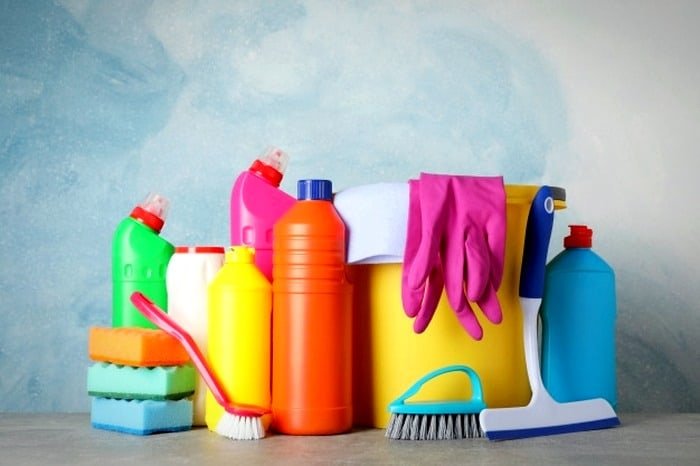Consequences of Improper Use of Cleaning Products
The fumes and gases from acidic cleaning agents can damage the respiratory system and affect the eyes and skin of those exposed. The severity of these side effects depends on the duration of exposure. Be cautious when using these products and chemical bleaches in enclosed spaces, such as bathrooms, as they can cause poisoning and symptoms similar to asthma, which may not completely resolve. Therefore, always follow the safety guidelines on the product and use protective gear like masks to prevent serious damage to the skin, eyes, and respiratory system.
Keep cleaning products out of reach of children, especially duringspring cleaning.doing so can lead them to confuse these substances with drinks, resulting in liver damage, digestive issues, and even death. Many chemical burns at home and in workplaces stem from these chemicals. The severity and depth of the injury depend on the concentration of the chemical (acidic, alkaline) and the duration of contact.

Do cleaning agents damage eyesight?
One of the urgent issues with improper use of chemical cleaners is the entry of any chemical into the eyes, which can lead to vision impairment. Due to the importance and sensitivity of the eyes, immediate treatment is necessary, and precautions should be taken to prevent and reduce damage from these chemicals.
Are alkaline substances more dangerous than acidic ones?
Acidic cleaning agents cause superficial damage to the eyes, as the coagulated proteins in the outer layer of the cornea prevent deeper penetration. Damage is limited to the eyelids and conjunctiva area. In contrast, alkaline cleaners rapidly penetrate the deeper layers and release proteolytic enzymes, exacerbating injuries. Alkaline substances can reach the anterior chamber of the eye in just 5 to 15 minutes, ultimately causing injury to the eyelashes, lens, and iris.
Take tear production seriously:
Common symptoms of eye damage from chemicals include burning, light sensitivity, pain, and especially tearing, which can lead to redness and blurred vision.

Avoid which chemicals?
We must be cautious when using cleaning agents, especially bleaches containing hypochlorite, as they are often available as disinfectants. If bleaches come into contact with the skin, they are very dangerous.
Eye protection measures:
If chemicals get into the eyes, first rinse with cool, pressurized water for 10 minutes until the burning sensation subsides, without rubbing the area with your hands.
Always pay attention to the instructions on the product label to avoid harming your health.
To reduce and prevent damage from cleaning products, you can use protective measures such as goggles, gloves, and masks.
Eye wash solution (saline)
In addition to being helpful for rinsing the eyes after contact with acidic materials, saline should be used after contacting alkaline substances following the use of anesthetic drops; however, this should be done under medical supervision, as self-medication can harm the optic nerve and cause perforation of the cornea’s surface.

Do cleaning agents cause respiratory harm?
The gases and vapors from cleaning products can cause respiratory illnesses, as inhaling them damages the respiratory system and leads to symptoms such asshortness of breath,burning of the airways,coughing,and even death. Therefore, pregnant women during the first and last trimestersof pregnancyshould strictly avoid using cleaning products, as they can lead to asthma issues inthe fetus.Even if you experience skin issues such as itching, burning, swelling, or redness while using cleaning products, seek medical attention as soon as possible.
Recommendations for safe use of cleaning products:

Use unscented cleaning products.
Use antibacterial cleaners only for specific situations to prevent spreading infections.
Wash hands thoroughly throughout the day and before eating to prevent disease spread instead of relying solely on disinfecting surfaces.
Avoid storing or using hazardous cleaners, such as bleach sprays and gas cleaners.
Side effects of cleaning products







